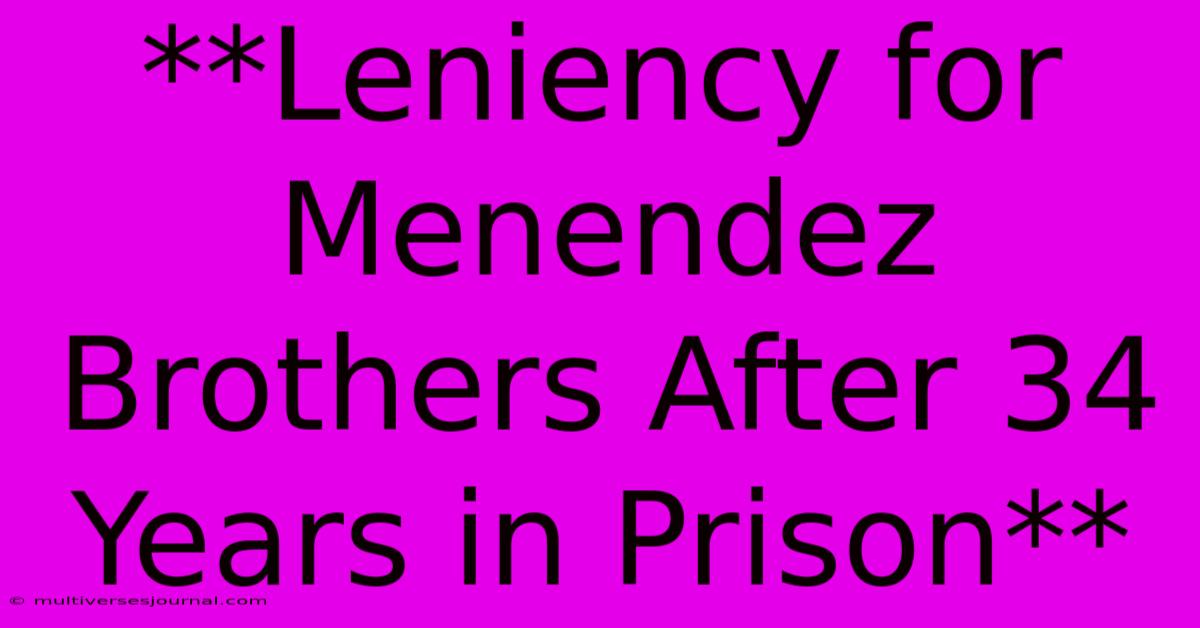**Leniency For Menendez Brothers After 34 Years In Prison**

Discover more detailed and exciting information on our website. Click the link below to start your adventure: Visit Best Website multiversesjournal.com. Don't miss out!
Discover more detailed and exciting information on our website. Click the link below to start your adventure: Visit Best Website mr.cleine.com. Don't miss out!
Table of Contents
Leniency for Menendez Brothers After 34 Years in Prison: Justice Served or Second Chance Gone Wrong?
The Menendez brothers, Lyle and Erik, have spent over three decades behind bars for the brutal murders of their parents, Jose and Kitty Menendez, in 1989. Now, after years of legal battles and public scrutiny, the brothers are once again at the center of a heated debate: should they be granted leniency?
A Brutal Crime and a Lengthy Trial:
The Menendez case captivated the nation. The brothers, initially portrayed as grieving sons, were eventually charged with the murder of their parents. The trial, which began in 1993, became a media sensation, with the brothers' alleged history of abuse and their claims of self-defense fueling endless debate. After a lengthy trial, both Lyle and Erik were found guilty of two counts of first-degree murder and sentenced to life in prison without the possibility of parole.
A Fight for Parole and New Arguments:
In recent years, the brothers have been actively pursuing parole, leveraging new arguments and focusing on their rehabilitation during their time in prison. They cite their exemplary behavior, participation in various programs, and their commitment to helping others as evidence of their transformation. Supporters of leniency point to the brothers' troubled childhood, claiming they were victims of parental abuse and that their actions were a desperate response to a traumatic situation.
The Opposing Viewpoints:
However, the debate surrounding the Menendez brothers' potential release is far from settled. Opponents of leniency argue that the brutality of the crime warrants a life sentence. They emphasize that the brothers premeditated the murders and that their actions were not simply a reactive response to abuse. Critics further point out that the brothers have shown little remorse for their actions and continue to maintain a degree of innocence, despite the overwhelming evidence against them.
A Complex Case with No Easy Answers:
The Menendez brothers' case is a complex one, filled with layers of tragedy, legal battles, and societal debate. The question of leniency is deeply personal and stirs strong emotions on both sides of the argument. Ultimately, the decision of whether or not to grant parole rests with the authorities, who must weigh the various factors involved and determine if the brothers pose a threat to society.
Moving Forward:
The Menendez case raises fundamental questions about justice, forgiveness, and the complexities of human behavior. It compels us to examine the factors that contribute to violent crime and to consider the potential for rehabilitation even in the most heinous of cases. Whether or not the brothers are granted leniency, their story serves as a stark reminder of the lasting consequences of violence and the ongoing debate surrounding the role of punishment and redemption in our criminal justice system.

Thank you for visiting our website wich cover about **Leniency For Menendez Brothers After 34 Years In Prison**. We hope the information provided has been useful to you. Feel free to contact us if you have any questions or need further assistance. See you next time and dont miss to bookmark.
Thank you for visiting our website wich cover about **Leniency For Menendez Brothers After 34 Years In Prison**. We hope the information provided has been useful to you. Feel free to contact us if you have any questions or need further assistance. See you next time and dont miss to bookmark.
Featured Posts
-
Puka Nacua Time For Rams To Trust
Oct 25, 2024
-
Where To Watch Thursday Night Football Tonight
Oct 25, 2024
-
1989 Case Da Pushes For Menendez Resentencing
Oct 25, 2024
-
Call Of Duty Black Ops 6 Patch Addresses Aim
Oct 25, 2024
-
Nfl Tnf Vikings At Rams Predictions And Updates
Oct 25, 2024
